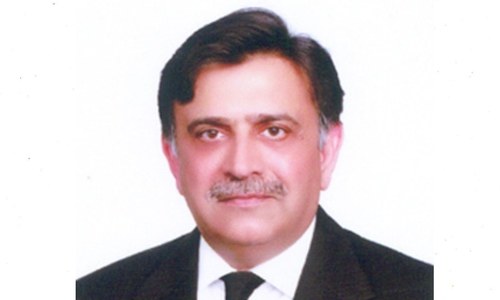THE world is a messy place for many reasons. One of them is that the values we as individuals, or as a nation, aspire to do not always coexist harmoniously. At times, there is a conflict or at the very least some tension between the values we espouse. For instance, judicial independence is a value we hold dear, the manifestation of which we saw in the lawyers movement, culminating in the eventual removal of a military dictator, who believed himself to be an Austinian sovereign.
But we, as a nation, also consider judicial accountability to be a value, which seemed to have been flouted, at times, by the very emblematic justice of the Supreme Court whose principled stand gave birth to the lawyers’ movement. The world is a messy place indeed.
The justices of the superior courts have been ensured independence through two mechanisms, one of which had already been allowed for in the Constitution; the other was crafted by apparently forcing the hand of the legislature through the 19th Amendment.
Read: Judges’ freedom of speech different from that of citizens, say SC judge
First, the serving judges exercise significant control over who can be considered and then appointed as a judge of the superior court. Second, before the expiry of the tenure, the only way a judge of the superior court can be removed is if the Supreme Judicial Council, constituted entirely of the superior court justices, finds misconduct. A code of conduct for the justices does exist, promulgated under Article 209(8) of the Constitution and containing broad standards. Without concrete rules, though, the application of the code is necessarily amorphous and discretionary.
Getting the right candidate on the first attempt is important.
Despite the entry and exit of the judges within the judiciary’s purview, the independence of the judiciary, as a value, is still not a given; ‘justice’ is just not possible in all cases, and, certainly, not against everyone. The persistence with which the removal of one judge of the Supreme Court is being relentlessly pursued, with such concerted effort, time and state resources, suggests as much.
If the government were serious about accountability, heightened disclosure requirements could be imposed on the justices at the time they take oath, and, subsequently, during each year they continue to hold office. But it is not about accountability; there are no principles at play, only a seemingly vindictive pursuit to have a judge removed, who may have ruffled some feathers.
Under the banner of independence, meanwhile, the judiciary jealously guards its prerogative to allow entry into the judicial club. The chief justices of the relevant high courts, and for appointment to the Supreme Court, the chief justice of Pakistan, initiate and send nominations to the Judicial Commission of Pakistan. Post the 18th and 19th Amendments a nod from the parliamentary committee is also required. Three such nominations were initiated for positions available at the Islamabad High Court back in 2019. They served as additional judges until now. None of the three has been confirmed.
The exercise of discretionary powers of the chiefs at their relevant courts initiating the names that triggers the whole exercise of confirmation can prove to be costly. When the additional justices are not confirmed, it imposes a cost on the public. First, it is from the public exchequer that the salaries and perks are doled out, even if temporarily. Second, individuals who have been subsequently deemed not the best fit for the job decide cases, which can then only be corrected for a potential error on appeal, costing additional litigation expense, anxiety and uncertainty. Third, there is lost time for the candidates who would have been an adequate fit for the job.
This obviously does not mean that good money should be thrown after bad. But it calls to attention the fact that getting the right candidate on the first attempt is important; some mistakes are costlier than others.
One way, however, through which the entire process of judicial appointments at the superior courts can be opened up for greater scrutiny is by increasing the number of candidates pulled from the district/sessions courts. The district court judges, already having served for three years as the senior-most judges of the lower judiciary, have a record available through which their reading of the law, and even integrity, can be ascertained. Second, and more importantly, by allowing judges of the lower courts to later serve one constitutional court, the pool of people drawn to serve as judges at the civil/magistrate courts would improve, with better opportunities in the future — a career path laid out. Currently, the lower courts and the constitutional courts seem to belong to two different countries, in two different eras.
But has the superior judiciary by insulating itself been successful in attaining independence? Seemingly yes, but not quite. Has accountability been compromised in the process? Yes. Ours is a messier world.
The writer is a litigator based in Islamabad.
Published in Dawn, June 7th, 2021















































